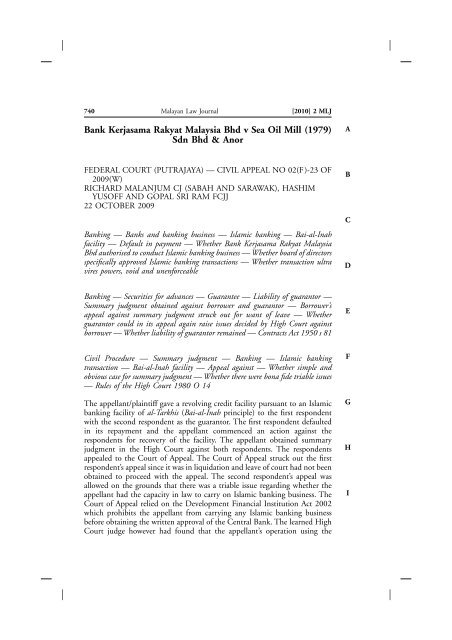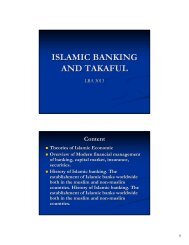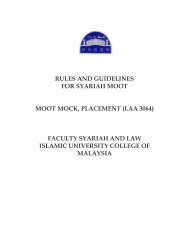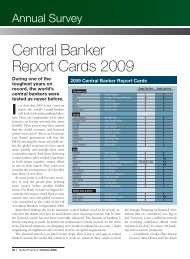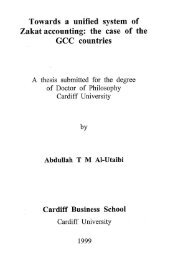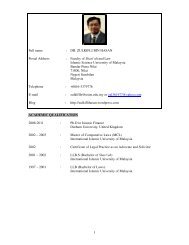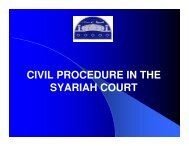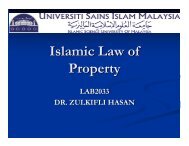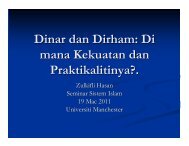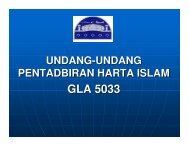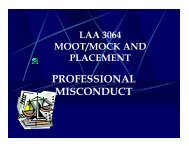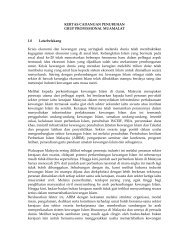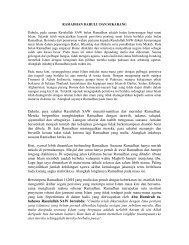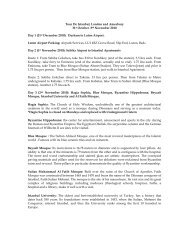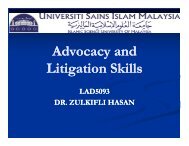Bank Kerjasama Rakyat Malaysia Bhd v Sea Oil Mill (1979) Sdn Bhd ...
Bank Kerjasama Rakyat Malaysia Bhd v Sea Oil Mill (1979) Sdn Bhd ...
Bank Kerjasama Rakyat Malaysia Bhd v Sea Oil Mill (1979) Sdn Bhd ...
- No tags were found...
Create successful ePaper yourself
Turn your PDF publications into a flip-book with our unique Google optimized e-Paper software.
740 Malayan Law Journal[2010] 2 MLJ<strong>Bank</strong> <strong>Kerjasama</strong> <strong>Rakyat</strong> <strong>Malaysia</strong> <strong>Bhd</strong> v <strong>Sea</strong> <strong>Oil</strong> <strong>Mill</strong> (<strong>1979</strong>)<strong>Sdn</strong> <strong>Bhd</strong> & AnorAFEDERAL COURT (PUTRAJAYA) — CIVIL APPEAL NO 02(F)-23 OF2009(W)RICHARD MALANJUM CJ (SABAH AND SARAWAK), HASHIMYUSOFF AND GOPAL SRI RAM FCJJ22 OCTOBER 2009<strong>Bank</strong>ing — <strong>Bank</strong>s and banking business — Islamic banking — Bai-al-Inahfacility — Default in payment — Whether <strong>Bank</strong> <strong>Kerjasama</strong> <strong>Rakyat</strong> <strong>Malaysia</strong><strong>Bhd</strong> authorised to conduct Islamic banking business — Whether board of directorsspecifically approved Islamic banking transactions — Whether transaction ultravires powers, void and unenforceableBCD<strong>Bank</strong>ing — Securities for advances — Guarantee — Liability of guarantor —Summary judgment obtained against borrower and guarantor — Borrower’sappeal against summary judgment struck out for want of leave — Whetherguarantor could in its appeal again raise issues decided by High Court againstborrower — Whether liability of guarantor remained — Contracts Act 1950 s 81ECivil Procedure — Summary judgment — <strong>Bank</strong>ing — Islamic bankingtransaction — Bai-al-Inah facility — Appeal against — Whether simple andobvious case for summary judgment — Whether there were bona fide triable issues— Rules of the High Court 1980 O 14The appellant/plaintiff gave a revolving credit facility pursuant to an Islamicbanking facility of al-Tarkhis (Bai-al-Inah principle) to the first respondentwith the second respondent as the guarantor. The first respondent defaultedin its repayment and the appellant commenced an action against therespondents for recovery of the facility. The appellant obtained summaryjudgment in the High Court against both respondents. The respondentsappealed to the Court of Appeal. The Court of Appeal struck out the firstrespondent’s appeal since it was in liquidation and leave of court had not beenobtained to proceed with the appeal. The second respondent’s appeal wasallowed on the grounds that there was a triable issue regarding whether theappellant had the capacity in law to carry on Islamic banking business. TheCourt of Appeal relied on the Development Financial Institution Act 2002which prohibits the appellant from carrying any Islamic banking businessbefore obtaining the written approval of the Central <strong>Bank</strong>. The learned HighCourt judge however had found that the appellant’s operation using theFGHI
<strong>Bank</strong> <strong>Kerjasama</strong> <strong>Rakyat</strong> <strong>Malaysia</strong> <strong>Bhd</strong> v <strong>Sea</strong> <strong>Oil</strong> <strong>Mill</strong> (<strong>1979</strong>)[2010] 2 MLJ <strong>Sdn</strong> <strong>Bhd</strong> & Anor (Hashim Yusoff FCJ)741ABCDEFGHIShariah principles were in order and in accordance of the appellant’s board ofdirectors’ resolution as provided under the <strong>Bank</strong> <strong>Kerjasama</strong> <strong>Rakyat</strong> <strong>Malaysia</strong>Berhad (Special Provisions) Act 1978 (‘Act 202’). Leave was granted to theappellant to appeal to the Federal Court on the following question of law:whether the second respondent as a guarantor could again raise issues decidedby the High Court against the first respondent as the borrower whereasjudgment against the first respondent was maintained by the Court of Appealand furthermore the second respondent did not and had never challenged theguarantee agreement signed.Held, allowing the appeal with costs:(1) The appellant’s operation using the Shariah concept was in order as itwas in accordance with the resolution of its board of directors, asprovided under Act 202 (see para 12).(2) Since the first respondent’s appeal was struck out it meant that thesummary judgment given by the High Court against the firstrespondent still remained. Thus, the second respondent’s liability as theguarantor for the first respondent also remained by virtue of s 81 of theContracts Act 1950. The suit by the appellant against the secondrespondent as the guarantor was therefore valid (see paras 13 & 23);Ginlon (M) <strong>Sdn</strong> <strong>Bhd</strong> v MBf Finance <strong>Bhd</strong> [2004] 2 MLJ 646 followed.(3) The question whether the appellant could carry on Islamic banking ornot did not arise. The simple fact was that the first respondent receiveda large sum of money from the appellant and then defaulted in itsrepayment. Both the first and second respondents were well aware oftheir respective contractual responsibilities and liabilities in the event ofdefault of repayment. There was no triable issue arising from theappellant’s claim against the second respondent. The appellant wasproperly authorised to carry on its Islamic banking according to theminutes of the meeting of its board of directors and also the minutes ofthe meeting of the Majlis Pengawasan Syariah. Therefore the questionposed was answered in the negative (see paras 24–26).[Bahasa <strong>Malaysia</strong> summaryPerayu/plaintif memberikan kemudahan pinjaman pusingan berikutankemudahan perbankan Islam al-Tarkhis (prinsip Bai al-Innah) kepadaresponden pertama dan responden kedua sebagai penjaminnya. Respondenpertama gagal membayar balik dan perayu memulakan tindakan terhadapresponden-responden bagi mendapatkan semula jumlah pinjaman tersebut.Perayu memperoleh penghakiman terus di Mahkamah Tinggi terhadapkedua-dua responden. Responden-responden merayu ke Mahkamah Rayuan.Mahkamah Rayuan menolak rayuan responden pertama memandangkanresponden pertama dalam likuidasi dan keizinan mahkamah tidak lagi
742 Malayan Law Journal[2010] 2 MLJdiperolehi untuk meneruskan dengan rayuan itu. Rayuan responden keduadibenarkan atas alasan-alasan bahawa terdapat isu yang perlu dibicarakanberkenaan sama ada perayu mempunyai kapasiti dari segi undang-undanguntuk menjalankan perniagaan perbankan Islam. Mahkamah Rayuanmenggunapakai Akta Institusi Kewangan Pembangunan 2002 yangmenghalang perayu menjalankan perniagaan perbankan Islam sebelummendapat keizinan bertulis daripada <strong>Bank</strong> Negara. Hakim Mahkamah Tinggiyang bijaksana walau bagaimanapun mendapati bahawa operasi perayumenggunakan prinsip-prinsip Syariah adalah teratur dan menurut resolusilembaga pengarah perayu seperti yang diperuntukkan di bawah Akta <strong>Bank</strong><strong>Kerjasama</strong> <strong>Rakyat</strong> <strong>Malaysia</strong> Berhad (Peruntukan Khas) 1978 (‘Akta 202’).Keizinan telah diberikan kepada perayu untuk merayu ke MahkamahPersekutuan atas persoalan perundangan berikut: sama ada responden keduasebagai penjamin boleh membangkitkan semula isu-isu yang telahdiputuskan oleh Mahkamah Tinggi terhadap responden pertama sebagaipeminjam sementara penghakiman terhadap responden pertama dikekalkanoleh Mahkamah Rayuan dan seterusnya responden kedua tidak dan tidakpernah mencabar perjanjian jaminan yang ditandatangani.Diputuskan, membenarkan rayuan dengan kos:(1) Operasi perayu menggunakan konsep Syariah adalah teratur danmenurut resolusi lembaga pengarahnya, seperti yang diperuntukkan dibawah Akta 202 (lihat perenggan 12).(2) Memandangkan rayuan responden pertama ditolak, ini bermaksudbahawa penghakiman terus yang diberikan oleh Mahkamah Tinggiterhadap responden pertama masih kekal. Oleh itu, liabiliti respondenkedua sebagai penjamin kepada responden pertama juga kekalberikutan s 81 Akta Kontrak 1950. Guaman oleh perayu terhadapresponden kedua sebagai penjamin oleh itu sah (lihat perenggan 13 &23); Ginlon (M) <strong>Sdn</strong> <strong>Bhd</strong> v MBf Finance <strong>Bhd</strong> [2004] 2 MLJ 646 diikut.(3) Persoalan sama ada perayu boleh menjalankan perbankan Islam atautidak, tidak timbul. Ringkasnya di sini ialah bahawa responden pertamatelah menerima sejumlah wang yang banyak daripada perayu dankemudiannya gagal membayar balik. Kedua-dua responden amatmaklum terhadap kewajipan dan liabiliti kontraktual masing-masingjika gagal membuat bayaran. Tiada isu yang boleh dibicarakanberbangkit daripada tuntutan perayu terhadap responden kedua. Perayudiberi kuasa untuk menjalankan perbankan Islam menurut minitmesyuarat lembaga pengarahnya dan juga minit mesyuarat MajlisPengawasan Syariah. Oleh itu, persoalan yang diajukan dijawab dalamnegatif (lihat perenggan 24 & 26).]ABCDEFGHI
<strong>Bank</strong> <strong>Kerjasama</strong> <strong>Rakyat</strong> <strong>Malaysia</strong> <strong>Bhd</strong> v <strong>Sea</strong> <strong>Oil</strong> <strong>Mill</strong> (<strong>1979</strong>)[2010] 2 MLJ <strong>Sdn</strong> <strong>Bhd</strong> & Anor (Hashim Yusoff FCJ)743ABCDEFNotesFor cases on banking, see 2(1) Mallal’s Digest (4th Ed, 2007 Reissue) paras7119–7121.For cases on guarantee, see 1 Mallal’s Digest (4th Ed, 2005 Reissue) paras2139–2184.For cases on Islamic banking, see 1 Mallal’s Digest (4th Ed, 2005 Reissue)paras 1952–1954.Cases referred toGinlon (M) <strong>Sdn</strong> <strong>Bhd</strong> v MBf Finance Berhad [2004] 2 MLJ 641, CA (folld)Legislation referred to<strong>Bank</strong> <strong>Kerjasama</strong> <strong>Rakyat</strong> <strong>Malaysia</strong> Berhad (Special Provisions) Act 1978s 14(g)Companies Act 1965 s 226(3)Contracts Act 1950 s 81Development Financial Institution Act 2002 s 129(1)Rules of the High Court 1980 O 14Appeal from: Civil Appeal No W-02–298 of 2003 (Court of Appeal,Putrajaya)Khairuddin bin Abdul Ghani (John Clark with him) (Amir Ruhana &Khairuddin) for the appellant.K Sinniah (AI Nathan) for the respondents.Hashim Yusoff FCJ (delivering judgment of the court):GH[1] On 18 May 2009 this court gave leave to appeal to the appellant on thefollowing question of law:Whether the second respondent as a guarantor could again raise issues decided bythe High Court against the first respondent as the borrower whereas judgmentagainst the first respondent was maintained by the Court of Appeal andfurthermore the second respondent did not and has never challenged the guaranteeagreement signed.I[2] We allowed the appeal and now give our reasons.BACKGROUND[3] The appellant (plaintiff) filed a suit in Kuala Lumpur High Courtagainst the first respondent as the borrower (principal debtor) and the second
744 Malayan Law Journal[2010] 2 MLJrespondent as the guarantor for a claim of RM30,983,718.53 as at 20October 1998 pursuant to an Islamic banking facility of al-Tarkhis(Bai-al-Inah principle).[4] The first and second respondent entered memorandum of appearanceon 8 January 1999.[5] The appellant thereafter filed an application for summary judgment on4 February 1999 pursuant to O 14 of the Rules of the High Court 1980(‘RHC’).[6] The hearing proceeded on affidavits filed therein and the applicationwas dismissed before the senior assistant registrar but on appeal to the judgein chambers, the said appeal was allowed and summary judgment was enteredagainst both the first and second respondents. The grounds of judgment bythe learned High Court judge appeared at pp 45–58 of the record of appeal(I).[7] Both respondents filed an appeal to the Court of Appeal on 12 May2003 and on the grounds as appeared in the memorandum of appeal dated12 May 2003 at pp 32–35 of the rekod rayuan (I).[8] On 15 May 2008, the Court of Appeal struck out with costs the firstrespondent’s appeal as it was in liquidation since 5 October 2005 and had notobtained leave of court in compliance with s 226(3) of the Companies Act1965, to proceed with the appeal. But the Court of Appeal allowed thesecond respondent’s appeal. Hence this appeal before us.[9] Learned counsel for the appellant submitted that the Court of Appealin allowing the second respondent’s appeal decided on only one issue ie:Whether at the date of the facility was granted to the first respondent in August1997, the plaintiff (appellant) could lawfully grant the facility under Islamicbanking principles when the plaintiff was a co-operative society registered ordeemed registered under the Co-Operatives Societies Act 1993 (see rekod rayuantambahan p 6, lines 15–25).ABCDEFGH[10] The Court of Appeal held that this is an issue of both facts and law.As such it was a serious issue which could only be decided after witnesses hadgiven evidence on behalf of the plaintiff as to its capacity in law to carry onIslamic banking business.I[11] In arriving at its decision the Court of Appeal had relied on theDevelopment Financial Institution Act 2002 (‘Act 618’) whereby the
<strong>Bank</strong> <strong>Kerjasama</strong> <strong>Rakyat</strong> <strong>Malaysia</strong> <strong>Bhd</strong> v <strong>Sea</strong> <strong>Oil</strong> <strong>Mill</strong> (<strong>1979</strong>)[2010] 2 MLJ <strong>Sdn</strong> <strong>Bhd</strong> & Anor (Hashim Yusoff FCJ)745ABCDEFGHIappellant was, inter alia, one of the financial institutions listed in the scheduleof the order. As such the appellant is also governed by Act 618, which unders 129(1) of the same Act, prohibits a prescribed institution from carrying anyIslamic banking business or Islamic financial business before obtaining theprior written approval of the Central <strong>Bank</strong> of <strong>Malaysia</strong>. Therefore the Courtof Appeal held that it was not a simple and obvious case because there wereissues to be tried.[12] Learned counsel for the appellant submitted that the Court of Appealhad erred in applying Act 618. As was held by the High Court, the appellantcame under and was bound by the provisions of the <strong>Bank</strong> <strong>Kerjasama</strong> <strong>Rakyat</strong><strong>Malaysia</strong> Berhad (Special Provisions) Act 1978 (‘Act 202’) and the by-lawsunder Act 202. The learned High Court judge found as a fact that theappellant’s operation using the Shariah principles were in order and inaccordance of the appellant’s board of directors’ resolution as provided underAct 202.[13] He further submitted that since the appeal of the first respondent asthe principal borrower/debtor was struck out, it meant that the judgment ofthe High Court against it still stands. This also meant that the secondrespondent, as the guarantor for the first respondent, remains liable for thedebt. Reference was made to s 81 of the Contracts Act 1950 which provides:The liability of the surety is co-extensive with that of the principle debtor, unlessit is otherwise provided by the contract.[14] In the case of Ginlon (M) <strong>Sdn</strong> <strong>Bhd</strong> v MBf Finance Berhad [2004] 2MLJ 641, Abdul Aziz Mohammad JCA (as he then was) opined regardings 81 of the Contracts Act 1950 as follows:... that is a contract of guarantee. The remedy of the person to whom the guaranteeis given is therefore to sue the surety on his undertaking in the contract ofguarantee, if the third person defaults.[15] The submission of learned counsel for the second respondent isbasically an attempt to defeat the appellant’s claim by saying that theappellant was not authorised to carry on Islamic banking. He referred tos 14(g) of the <strong>Bank</strong> <strong>Kerjasama</strong> <strong>Rakyat</strong> <strong>Malaysia</strong> Berhad (Special Provisions)Act 1978 (‘Act 202’) which provides:14(1) In addition to the powers, functions, duties, and responsibilitiesconferred or imposed on the <strong>Bank</strong> by the Ordinance, the rules madethereunder, and the by-laws of the <strong>Bank</strong>, the <strong>Bank</strong> may —
746 Malayan Law Journal[2010] 2 MLJ(a) ...(b) ...(c) ...(d) ...(e) ...(f) ...(g) carry on any other business expressly authorized by the Ministerwith the concurrence of the Minister of Finance.[16] It was his submission that Act 202 did not mention that <strong>Bank</strong> <strong>Rakyat</strong>could carry on Islamic banking.ABCD[17] He further submitted that in an O 14 application for summaryjudgment, an applicant would have to show that it is a plain and obvious case.COURT’S FINDING[18] There is no dispute that, at the first respondent’s request the appellantgave a revolving credit facility of RM20m and that the second respondenthad stood as a guarantor for the said facility (see the appeal record 221exh ABO4).[19] Clause 17 of the guarantee provides for the continuing liability of theguarantor as follows:CONTINUING LIABILITY OF GUARANTORThe obligations of the Guarantor hereunder shall not be discharged except byperformance and then only to the extent of such performance. Such obligationsshall not be subject to any prior notice to or demand to the Guarantor with regardto any default of the Customer and shall not be impaired by any extension of timeforbearance or concession given to the Customer or any assertion or failure of anysecurity created by or in pursuance of the Security Documents and or anymodification or amplification of the provisions thereof contemplated by the termsthereof or any failure of the Customer to comply with any requirements of any lawregulations or order in <strong>Malaysia</strong> or of any political subdivision or agency thereof.EFGHI[20] It is also common ground that the first respondent defaulted in itsrepayment. Hence the suit by the appellant against the second respondentbeing the first respondent’s guarantor for the said facility.
<strong>Bank</strong> <strong>Kerjasama</strong> <strong>Rakyat</strong> <strong>Malaysia</strong> <strong>Bhd</strong> v <strong>Sea</strong> <strong>Oil</strong> <strong>Mill</strong> (<strong>1979</strong>)[2010] 2 MLJ <strong>Sdn</strong> <strong>Bhd</strong> & Anor (Hashim Yusoff FCJ)747ABCDEFGHI[21] It is the finding of the High Court that although the appellant was nota company under the provisions of the Companies Act 1965, it did not meanthat it could not carry on Islamic banking operation. The learned High Courtjudge found as a fact that the appellant’s operation using the Shariah conceptwas in order as it was in accordance with the resolution of its board ofdirectors, as specially provided under the Act 202.[22] The Court of Appeal in striking out the appeal of the first respondentwhich was the principal borrower/debtor however allowed the appeal by thesecond respondent who was the guarantor for the first respondent, on thegrounds that the appellant’s capacity to give the revolving credit to the firstrespondent was a serious issue of fact and law that needed to be tried by thecalling of witnesses.[23] With respect, we cannot agree with the reasoning given by the Courtof Appeal. Since the first respondent’s appeal was struck out it meant that theO 14 summary judgment given by the High Court against the firstrespondent, still remains. It follows that the second respondent’s liability asthe guarantor for the first respondent also remains, by virtue of s 81 of theContracts Act 1950. The suit by the appellant against the second respondentas the guarantor is therefore valid, following the decision of the Court ofAppeal in the case of Ginlon (M) <strong>Sdn</strong> <strong>Bhd</strong> v MBf Finance Berhad.[24] The question whether the appellant could carry on Islamic banking ornot does not arise. The simple fact is that the first respondent received a largesum of money from the appellant and then defaulted in its repayment. Thesecond respondent was also sued by the appellant based on his guarantee forthe said revolving credit. Both the first and second respondents were wellaware of their respective contractual responsibilities and liabilities in the eventof default of repayment.[25] From the evidence available, we do not see any triable issue arisingfrom the appellant’s claim against the second respondent. We also agree withthe learned High Court judge that the appellant was properly authorised tocarry on its Islamic banking according to the minutes of the meeting of itsboard of directors dated 29 April 1993 (see the appeal record 344 exh ABO37and also the minutes of the meeting of the Majlis Pengawasan Syariah Bil2/94 dated 29 November 1994 which clearly stated their approval to theoverdraft facility according to Shariah concept of Bai-al-Inah which wasnamed as al-Tarkhis (Istimewa) facility.
748 Malayan Law Journal[2010] 2 MLJ[26] For the above reasons we would answer the question posed, in thenegative. The appeal by the second respondent is allowed with costs fixed atRM20,000 for the appellant. The order of the High court is restored. Depositis to be given to the appellant towards costs.Appeal allowed with costs.ABReported by Kanesh SundrumCDEFGHI


